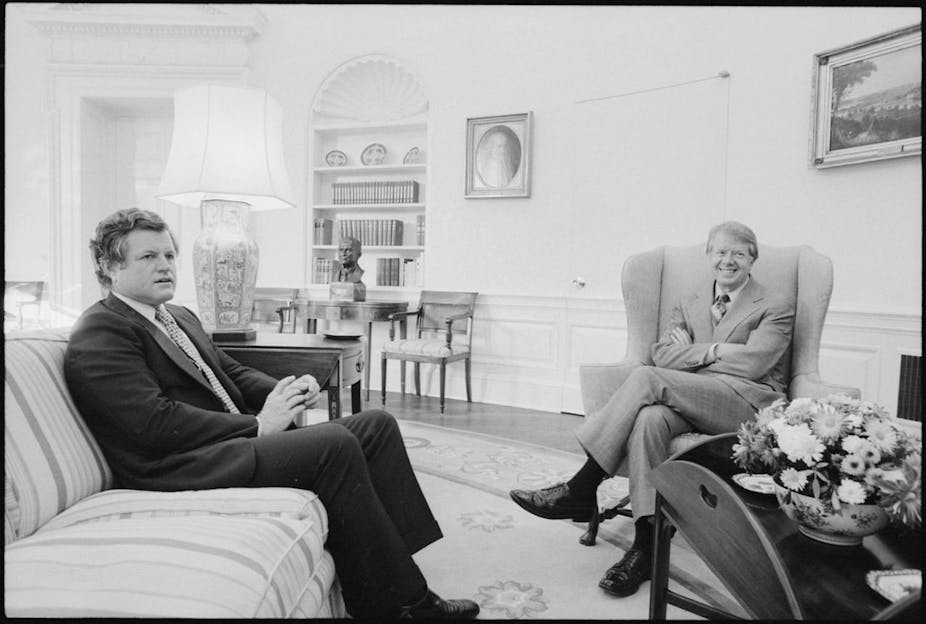On March 30, a host of Washington DC political glitterati gathered on Dorchester’s windswept Columbia Point in Boston to celebrate the opening of the Edward M. Kennedy Institute for the United States Senate.
Dignitaries ranging from President Barack Obama to former Republican presidential nominee John McCain came to pay homage to the institute’s namesake and “Lion of the Senate,” the late Ted Kennedy of Massachusetts. A now legendary figure, Kennedy has long been credited with keeping liberalism alive as a viable political force in an era of unquestioned conservative ascendancy. Even McCain, his longtime friend and Senate rival, seemed to concede this. “We all listened to him,” the Arizonan said. “He was hard to ignore.”
What was left unsaid was the not inconsiderable role Kennedy played in making conservatism, especially that espoused by Ronald Reagan and his tax-cutting, foreign-interventionist successors, the dominant political ideology over the past three decades.
Kennedy’s run helped the rise of Reagan
For in 1980 Kennedy helped to make possible Reagan’s elevation to the White House by challenging incumbent President Jimmy Carter in that year’s Democratic primary, thereby splitting the party of Jackson and Roosevelt at a pivotal moment in our nation’s history.
The move came as something of a shock to Carter, who had succeeded a Watergate-damaged Gerald Ford in the Oval Office three years earlier. “When Senator Kennedy had come to the White House for a visit in March 1979 and I told him [of his decision to seek a second term], he reaffirmed his support for me,” Carter later wrote in a memoir.
But the former Georgia peanut farmer turned politician could not know the tremendous pressure that was being brought to bear on Kennedy to run that year. Kennedy possessed, after all, one of the most famous last names in American politics. His martyred brothers John and Robert had been elevated to near sainthood status in liberal Democratic circles and Kennedy seemed their natural heir. As one close aide later told a Boston Globe interviewer, “It was an event that had to occur. It was expected of him to run. People were saying, ‘When are you going to do it? When are you going to do it? Why not now?’ He could never escape ‘When are you going to do it?’ He may have succumbed or reached the point when he decided to get it done.”
If this wasn’t a compelling enough reason to throw his hat in the ring, Kennedy also harbored deep reservations about Carter’s leadership, especially in the wake of a faltering domestic economy, high inflation and the seizure of the American Embassy in Iran by radical Muslim students. “The nation plunged into shock,” Kennedy said in his 2009 posthumously published autobiography. Carter had not helped his own cause by ill-advisedly delivering a nationally televised “Crisis in Confidence” speech that seemed to blame the American people for the country’s problems. Dubbed the “malaise speech” by the media, despite Carter’s making no mention of the term, the address outraged Kennedy. “This message was contrary to – it was in conflict with – all the ideals of the Democratic Party that I cherished,” he claimed.
Kennedy’s presidential campaign quickly goes nowhere
Officially launching his candidacy at Boston’s historic Faneuil Hall in November 1979, Kennedy quickly ran into problems. His campaign organization was substandard, his speeches dull and unfocused and his support among broader moderate elements in his party lacking. He also faced doubts about his character when voters were reminded of his connection to the 1969 automobile-related death of Mary Jo Kopechne, an attractive 28-year-old political operative who had worked on his late brother’s Robert presidential campaign the previous year. Kennedy had been behind the wheel at the time.
Carter had earlier vowed to “whip (Kennedy’s) ass” and now he made good on his promise, easily carrying the majority of Democratic primary states. Yet Kennedy refused to go quietly, battling Carter deep into the 1980 Democratic National Convention. Only when it became obvious that Carter had more than enough delegates sewn up did Kennedy concede the nomination.
“For all those whose cares have been our concern, the work goes on, the cause endures, the hope still lives, and the dream shall never die,” Kennedy emotionally told his supporters in his concession speech.
Carter never recovered. Having expended so much political and financial capital fending off Kennedy’s challenge, he was easy pickings for Reagan in that fall’s general election.
Ironically, Kennedy spent the remainder of his life and Senate career fighting the unrestrained militarism and spending cuts to his cherished social safety net programs that Reagan’s radical conservative program unleashed on the country after 1980.
Such a rearguard action would not have been necessary if Kennedy had only decided not to take the presidential plunge. Apparently the roar of the Lion of the Senate drowned out sound political judgment.

